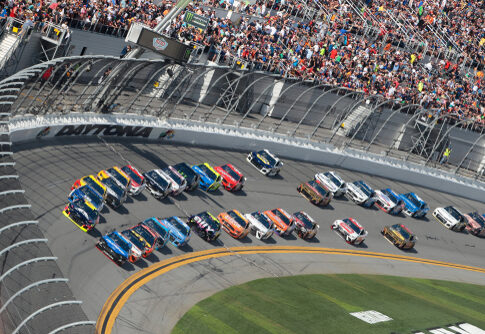As with other sports, when a new rule appears to dampen protocol, many people wonder if it was worthwhile. Many veteran drivers have reacted negatively to NASCAR’s new open exemption provisional rule. Denny Hamlin, for example, believes it cheapens the sport. However, some people are fine with its inception.
NASCAR’s Controversial New Rule
NASCAR’s recent introduction of the Open Exemption Provisional (OEP) rule has ignited a fierce debate within the racing community. This new regulation allows for a 41st spot in the Daytona 500 for a “world-class driver” from another series who fails to qualify through traditional means. While NASCAR frames this as a move to enhance competition, many see it as a potential threat to the sport’s integrity.
The rule’s first beneficiary is set to be Helio Castroneves, a renowned IndyCar driver. Trackhouse Racing has requested the provisional for Castroneves, making him the sole eligible driver for the 41st spot in the upcoming Daytona 500. This decision has sparked controversy, with some viewing it as a marketing ploy rather than a genuine competitive measure.
It’s probably not a big deal to most but this rule change makes me absolutely sick. Out of all the issues we could work on, this stuck out to them? So bizarre https://t.co/lqHqFb0ijJ pic.twitter.com/sB0SzPlwgW
— dale tanhardt (@daletanhardt) January 21, 2025
Drivers Divided
The NASCAR community is split on the merits of this new rule. Critics, led by veteran driver Denny Hamlin, argue that it undermines the sport’s traditional qualifying process and sends the wrong message about NASCAR’s standards.
“My opinion on this was that it was desperate. I didn’t like it,” Hamlin stated, adding, “NASCAR is the highest form of motorsports in the U.S., so why can’t we act like the big boys and say, ‘If you want to come over here and run with us, show me what you got. Go qualify in the race.”
Hamlin’s concerns reflect a broader sentiment among some drivers and fans who fear that the rule prioritizes star power and marketability over the hard-earned skills and dedication that have long defined NASCAR’s competitive spirit.
Denny Hamlin on the Open Exemption Provisional rule
"It reeks of desperation. I don't love it. It's just reaching to do whatever you can to make a headline. It's a short term gain at a long-term loss."
Says that a driver with credentials should come here and earn it. pic.twitter.com/ymBOYpHtnQ
— Matt Weaver (@MattWeaverRA) February 1, 2025
Implications for the Sport
The introduction of the OEP rule raises questions about the future direction of NASCAR. While it may attract high-profile drivers from other racing disciplines, potentially boosting viewership and sponsorship, it also risks alienating core fans and competitors who value the sport’s traditional meritocracy.
This comparison to short-track racing practices does little to assuage concerns about the rule’s impact on NASCAR’s top-tier events. The Daytona 500, often referred to as “The Great American Race,” has long been revered for its grueling qualification process and the prestige it confers upon its participants. By potentially allowing drivers to bypass this process, NASCAR risks diluting the event’s significance and the achievements of those who qualify through traditional means.
Looking Ahead
As NASCAR moves forward with this controversial rule, its implementation and impact will be closely watched. The success or failure of the OEP could have far-reaching consequences for the sport’s future, potentially influencing everything from race formats to driver recruitment strategies.
While the intent may be to increase NASCAR’s appeal and competitiveness on a global scale, the organization must tread carefully to avoid alienating its core audience and compromising the values that have made it a cornerstone of American motorsports. As the debate continues, the true test will come when the green flag drops at the Daytona 500, with all eyes on how this new era of NASCAR unfolds on the track.
Sources:
- The NASCAR Provisional Rule: What You Need to Know
- Denny Hamlin doubles down on NASCAR open exemption provisional take, fires back at Larry McReynolds


